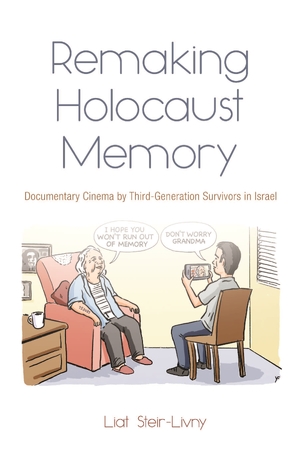"The legacy of the Holocaust continues to reverberate and evolve in Jewish culture and beyond and this book makes an important contribution to it by identifying, defining, and evaluating the next stage in that legacy."—Yaron Peleg, Kennedy-Leigh Reader in Modern Hebrew Studies, University of Cambridge
"A much-needed and most valuable study on the research of Holocaust awareness and of Holocaust cinematic representations."—Nurith Gertz, professor emerita of Hebrew literature and film at The Open University of Israel
"Steeped in the scholarly literature of film, gender, Holocaust, and memory studies, Steir-Livny lucidly delineates and explains the differences in cinematic techniques, directorial intent, and subject matter of Holocaust documentaries produced by second- and third-generation Israeli filmmakers."—Lawrence Baron, professor emeritus, San Diego State University
"Remaking Holocaust Memory aims to paint the first comprehensive portrait of [the] third-generation Holocaust documentaries phenomenon. It takes a cinematic, cultural, and sociohistorical comparative approach to examine how third-generation filmmakers have responded to previous narratives and representations."—New Books Network
"The first book-length academic study to investigate the subject from a cultural, cinematic and sociohistorical approach by analyzing the differences between the ways in which the third generation in Israel and second generation portray the Holocaust."—Jewish Link
"Steir-Livny skillfully interweaves two broad perspectives: on the one hand, she elucidates what makes Holocaust memory in the 21st century unique; on the other, she puts 21st-century memory in dialogue with earlier iterations. In the process, she demonstrates the ways in which third generation documentarians continue the work of their forebears while complicating the contours of commemoration. Steir-Livny's book will be of great value to scholars of Holocaust studies, cinema studies, and memory."—Choice
Description
Since the late 1990s in Israel, third-generation Holocaust survivors have become the new custodians of cultural memory, and the documentary films they produce play a major role in shaping a societal consensus of commemoration. In Remaking Holocaust Memory, a pioneering analysis of third-generation Holocaust documentaries in Israel, Liat Steir-Livny, co-recipient of the 2019 Young Scholar Award given jointly by the Association of Israel Studies and the Israel Institute, investigates compelling films that have been screened in Israel, Europe, and the United States, appeared in numerous international film festivals, and won international awards, but have yet to receive significant academic attention.
Steir-Livny’s comprehensive investigation reveals how the “absolute truths” that appeared in the majority of second-generation films are deconstructed and disputed in the newer films, which do not dismiss their “cinematic parents’ ” approach but rather rethink fixed notions, extend the debates, and pose questions where previously there had been exclamation marks. Steir-Livny also explores the ways in which the third-generation’s perspectives on Holocaust memory govern cinematic trends and aesthetic choices, and how
these might impact the moral recollection of the past.
Finally, Remaking Holocaust Memory serves as an excellent reference tool, as it helpfully lists all of the second- and third-generation films available, as well as the festival screenings and awards they have garnered.
About the Author
Liat Steir-Livny is an Associate Professor in the Department of Culture at Sapir Academic College in Israel and a tutor and course coordinator at The Open University of Israel. She is a co-recipient of the 2019 Young Scholar Award given jointly by the Association of Israel Studies and the Israel Institute.
6 x 9, 376 pages
April 2019




